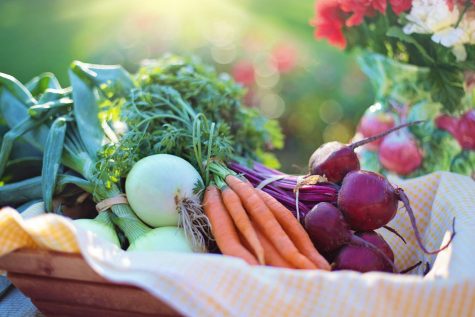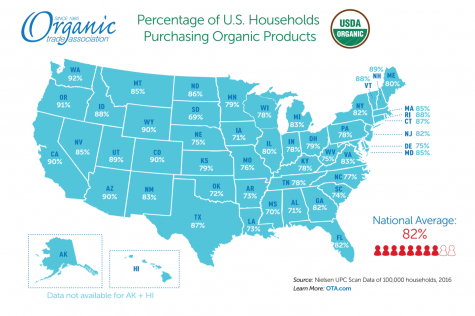Buying Organic Isn’t as Healthy as You Thought
May 9, 2019
49.4 billion.
That’s how much money organic sales in 2017 made in America alone, which set a new US record. Up 6.4 percent from the previous year, more and more consumers have been turning their lifestyles organic.
What exactly is organic? Well, its produce is grown without the use of pesticides, synthetic fertilizers, genetically modified organisms (GMO) or growth hormones.

The rise of households across America switching to organic has increased immensely throughout recent years. This way of living includes fresh, pesticide-free produce instead of conventionally grown produce.
But are there significant benefits for your body, as we’ve been told? Some researchers think otherwise. There is new evidence suggesting that organic foods aren’t as beneficial as we have thought.
“While organic foods have fewer synthetic pesticides and fertilizers and are free of hormones and antibiotics, they don’t appear to have a nutritional advantage over their conventional counterparts,” according to a study done by Harvard Medical School.
Basically, if comparing an orange that was conventionally grown, and one organically grown, there would not be a huge, noticeable nutritional difference for your body.
Yes, there are negatives of not eating organic produce, but evidence shows that it’s immensely more important to eat a variety of fruits and vegetables, then to avoid them because of pesticide concerns.
Generally, most fruits you eat after removing the outer covering— like oranges or bananas— are less likely to have pesticide contamination.
“If you thoroughly wash your produce with cold water and throw away the outer leaves of leafy vegetables (like romaine), you will remove most of the pesticide residue,” Dr. Roshini Raj from Health says.
Furthermore, the number one reason why people in the U.S. don’t buy organic produce is the cost.
“The USDA estimates that organically-produced food can cost anywhere from 10 to 30 percent more than conventionally mass-produced food,” according to Sarah Elliott, a writer on How Stuff Works.

The national average of households that have bought organic in 2016 is shown to be 82 percent in the U.S. States like Washington, Oregon, California, Colorado, Arizona and Wyoming proved to have the highest percentile of organic households; all being 90 percent or over.
The next few years of a high school or college students’ life, will be tied to the regulation of saving money. When organic foods can cost up to 30 percent more compared to non-organic foods, we have to ask the question. Does the benefit of organic foods outweigh the expense?
While it might only seem like a few dollars more at the store, the organic lifestyle can get pretty pricey.
However, growing organic produce rather than conventionally does show to have some benefits for the environment.
“[Organic produce] preserves crop varieties which results in higher soil quality that is safer for the environment,” according to writer Marilyn Gemino, it also “prohibits the use of all synthetic chemicals, [and] does not pose any threats for water contamination underground.”
Therefore, when walking into a grocery store or farmers market, it’s always important to know all of the ingredients and/or pesticides in the products you wish to buy. It’s up to you if you’ll join the movement of millions of Americans and switch to this organic lifestyle. With all of the data at hand contradicting this alternative, I will not be switching to organic.






Nora Tenorio ◊ Feb 13, 2023 at 9:19 pm
Nice post. I was checking constantly this blog and I am impressed! Very useful info specifically the last part 🙂 I care for such info a lot. I was looking for this particular info for a long time. Thank you and good luck.
Jayme Silvestri ◊ Apr 12, 2022 at 10:21 pm
Excellent blog here! Also your web site loads up very fast! What host are you using? Can I get your affiliate link to your host? I wish my site loaded up as fast as yours lol
Jayme Silvestri
Alisha Ross ◊ Feb 24, 2021 at 9:03 pm
I haven’t checked in here for a while because I thought it was getting boring, but the last few posts are good quality so I guess I will add you back to my everyday bloglist. You deserve it my friend 🙂
Regards
Ross Alisha
Hannah Flack ◊ Jan 14, 2021 at 8:37 pm
“Though it is a less common method of removing hair
at skin’s surface, some consumers find it primarily useful for fine hair on legs.
Braun epilators have captured a share of consumers and reviewers note that epilators bearing the Braun logo tend to win product pricing wars frequently.”
Regards Hannah Flack
Alisha Ross ◊ Jan 1, 2021 at 8:58 pm
“First off I want to say awesome blog! I had a quick question that I’d like to
ask if you don’t mind. I was interested to know how you center yourself and clear
your head before writing. I’ve had a hard time clearing my
thoughts in getting my thoughts out. I do take pleasure in writing but it just
seems like the first 10 to 15 minutes are generally
lost simply just trying to figure out how to begin. Any recommendations or tips?
AppreRegards
Ross Alishaciate it!”
Hannah Flack ◊ Oct 28, 2020 at 12:11 am
I did a vegan post last week (not sure if you saw it or not, so apologies if you did and saw it)! This is so cute! I had a pi day post planned but thought (duhhh!!) it was tomorrow so it will come tomorrow!x
Regards Hannah Flack
Alisha Ross ◊ Sep 28, 2020 at 11:55 pm
Hello! Would you mind if I share your blog with my
myspace group? There’s a lot of people that I think would really appreciate your content.
Please let me know. Many thanks
Regards
Ross Alisha
Alisha Ross ◊ Jun 2, 2020 at 9:29 pm
I think other site proprietors should take this website as an model, very clean and great user genial style and design, let alone the content. You’re an expert in this topic!
Regards
Ross Alisha
Rose Martine ◊ Mar 18, 2020 at 11:15 pm
Valuable information. Fortunate me I discovered your website by chance, and I’m shocked why this twist of fate did not took place earlier! I bookmarked it.
Regards
Rose Martine
Hannah Flack ◊ Feb 13, 2020 at 9:14 pm
Excellent, what a webpage it is! This weblog provides valuable facts to us, keep it up.
Regards
Hannah Flack
Ramona Mills ◊ Dec 5, 2019 at 10:20 pm
I really like your blog.. very nice colors & theme. Did you create this website yourself or did you hire someone to do it for you? Plz reply as I’m looking to create my own blog and would like to know where u got this from. cheers
Ramona Mills
Christian Rocha ◊ May 24, 2019 at 9:27 am
Organic doesn’t make it healthy it just means that it has not been messed with a-lot or it was not modified.
John ◊ May 21, 2019 at 1:12 pm
And the Sage is not publishing comments I have made on previous articles. My comments were not even offensive or anything so I dont know why they were removed.
Kylie Valency ◊ May 21, 2019 at 9:20 pm
John,
We have not been approving some of your comments because as it states in the area before you submit a comment, “[we aim for] this area to be used to foster healthy, thought-provoking discussion,” and we have felt like some of your comments, simply did not do that. We are working on making the comments on our articles add more to the article instead of simply jokes related to what is written.
If you have questions or concerns about some comments that were not approved, I am more than happy to discuss it with you.
Thank you,
Kylie Valency
Editor-in-Chief
Darius Rahmanian ◊ May 16, 2019 at 3:57 pm
John speaks the language of GODS
Max Wiggins ◊ May 13, 2019 at 10:57 am
gmo just make the apple bigger
Mary Deyo ◊ May 13, 2019 at 10:39 am
Nobody claims that organic foods hold a nutritional advantage. People who buy organic are usually not considering their nutritional “advantages” and instead thinking about the impact it has on the earth. Most people probably don’t clean their food enough to get rid of the pesticides, anyways, and removing the outer leaves of lettuce is a waste of food. People who understand the dangerous effect of pesticides on our health and environment often opt to buy organic.
duke ◊ May 13, 2019 at 9:48 am
is now vegetal hour
Brad Castleberry ◊ May 13, 2019 at 9:35 am
Organic farming practices reduce pollution, conserve water, reduce soil erosion, increase soil fertility, and use less energy. Farming without pesticides is also better for nearby birds and animals as well as people who live close to farms. It’s not always about how it effects us but how it effects our planet as a whole. that being said, buying organic is the way to go and should be promoted even if there are no nutritional advantages for us.